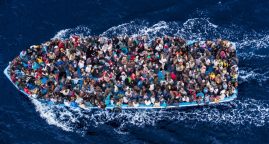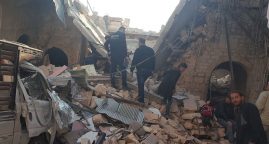Ethics and state funding: the quest for independent humanitarian action
Article published on Handicap International Blog on 02/22/2017 by Amandine Rave & Laurène Deglaire
The ethical analysis of state funding is designed to ensure the independence of humanitarian action. In situations of armed conflict, it must be dynamic and adapted to the context. Yet, given the changing nature of conflicts, it is imperative for NGOs to constantly review the safeguards it puts in place.
Handicap International works in complex armed conflict situations and takes great care to avoid political instrumentalization and thereby guarantee the independence of its action. It seeks to preserve its freedom to decide where, with whom and with what funding it operates. To this end, and by virtue of its principles of independence and impartiality, Handicap International’s ethical stance has for several years been not to accept funding from states that are politically and/or militarily involved in an armed conflict. Today, this stance is becoming increasingly difficult to maintain due to evolutions in the international context. Indeed, changes in the nature of armed conflicts, the resurgence of national sovereignty, the weakness of the United Nations and the war on terror are all factors making the analysis of a state’s engagement in a conflict an increasingly arduous task. In addition to this, the aid sector is encountering real difficulties due to economic constraints, such as the politicising of aid and the decreasing availability of funding. In light of all this, how do we maintain our ethical commitment to guaranteeing the independence of our action while also assuming our responsibility to take action?
A balancing act: analysing states’ engagement in conflicts
As we said earlier, the nature of conflicts is changing and becoming increasingly complex. In Syria and Iraq, the fighting is taking place on several fronts at once and involves numerous players, all with different agendas, against a backdrop of changing alliances. This is evident in the number of state parties to the international coalition currently active in Iraq (about 60 of them) and the volatility of the official positions adopted by these states, which change at the same pace as their geo-strategic interests and are sometimes at odds with their effective engagement in the field. Furthermore, some states occasionally play a determining political and diplomatic role in the way a conflict evolves without necessarily being visible or having a military presence on the ground. Does this mean we should refuse funding from France for activities in Yemen, for example, given France’s indirect support to the coalition led by Saudi-Arabia?
The same can be said of the economic involvement of certain states which don’t necessarily contribute to wars directly, but which benefit from them in economic terms, thereby giving a political hue to their funding. How many states are helping the DRC to introduce “lasting solutions” in exchange for profiting from the country’s immense wealth in natural resources? Is funding from these states any more ethically acceptable than funding from the United Nations which has a military presence in the country?
The conflicts underway in Nigeria, Mali and Libya do not stop at the borders of these countries. Their repercussions are felt throughout the region and are viewed through the lens of the war on terror by the rest of the world. As a result, states are conducting an increasing number of anti-terrorism operations beyond their borders. Legality aside, these operations potentially broaden possibilities for third-party military interventions. How should we consider third-party interventions in the war on terror in an ethical analysis?
Handicap International’s ethical stance on the acceptability of state funding is based on analyses that seek to establish distinctions and gradations: the type of engagement in a conflict (direct and/or indirect), the parts of the country concerned by the conflict, the types of financial instruments employed by the state, the degree of intrusion by the donor (conditions imposed), the populations’ perceptions (individuals, communities, civil society, authorities), the international framework within which an armed intervention is taking place, etc. But these gradations are open to interpretation.
For example, we are seeing an increasing number of international military operations that have not been authorised by the United Nations Security Council. Handicap International considers that funding from state parties to international coalitions that have been approved by the Security Council are acceptable from an ethical point of view because this is more a collective response to a threat to world peace than an exercise in bilateral coercion. Nevertheless, the fact that certain resolutions are vetoed by permanent members of the Security Council shows the extent to which decisions adopted by the Security Council are politicized, as with Syria and Iraq recently. So, should we continue to apply this criterion when the United National’s conflict resolution system is showing its limits and is clearly on its last legs?
Along the same lines, Handicap International considers that UN pooled funds are usually acceptable from an ethical standpoint as they “neutralise” bilateral funding by “de-politicising” it (except when a pooled fund is financed by a single state). Yet these funds are often criticised for a lack of objectivity in the attribution criteria, a lack of transparency and accountability and politicization issues – especially regarding integrated missions. This is why NGOs have always stressed the importance of maintaining bilateral aid. But how can we continue to do so when bilateral aid is also increasingly politicized?
Ethical analysis: still a necessary exercise
Given the changes in the international context and the increasingly difficult nature of the exercise, should we give up on analysing the level of engagement of individual states? Should we restrict ourselves to analysing the risk of political instrumentalization?
Unfortunately, the methods and means used by the belligerents in making war often violate the principles of International Humanitarian law. Using explosive weapons in populated areas or cluster munitions, bombing hospitals and schools and targeting civilians and aid workers are just a tiny sample of violations of the principles of distinction, proportionality and precaution that have serious humanitarian consequences. Furthermore, it is not rare for states engaging militarily in a conflict to simultaneously release funding for humanitarian aid in the country concerned. In these circumstances, the risk of humanitarian aid being instrumentalised for political purposes is high and NGOs want no part in promoting the states concerned – which would like to “win the hearts and minds’” of the people that their own actions are affecting.
But as well as the risk of political instrumentalization, for Handicap International there are also the issues of access to the population, impartiality, acceptance, and the security of our teams to consider. Accepting funds from a state party to a conflict would expose us to risks that could jeopardise our actions.
Therefore, we cannot waive the analysis of state’s individual engagement in conflicts: it is necessary, even if it isn’t perfect. The challenge is to find a balance that allows us to assert the independence of our actions from the political agendas of the states and also provide a response to crises. It is also to ensure that our position is consistent across all our programmes, regardless of the specific nature of each context.
In contexts where there is no other choice but to accept funding from involved states, or where the humanitarian imperative is overriding, it is crucial to state our concerns, give objective reasons for making an exception, make and assume a decision and attach conditions that will ensure the impact on operations is controlled and the risks for the population, personnel, programme and organisation are limited.
Ethics and humanitarian principles are fundamental to humanitarian action and NGO identity
In a context of limited institutional funding in which NGOs are forming consortia or even merging, and in which aid actors with different cultures are emerging (e.g. for-profit development companies), NGOS should constantly review and renew their ethical safeguards for preserving their independence and resisting the politicisation of humanitarian aid.
At Handicap International, our operational strategies require of us to fight for respect of humanitarian principles and an ethical approach to humanitarian action. It is not a matter of choosing between “ethics” and the “humanitarian imperative”, as ethics are an intrinsic part of our operations. They are the foundation and pre-condition on which these operations are based. They guarantee our freedom of choice, our freedom of action and speech, our acceptance, our access and our security. Ethics guide us and prompt us to take action in line with our mandate in order to meet the needs of the most vulnerable, regardless of the political agenda pursued by states. This is why we must not sacrifice ethical analysis on the altar of the humanitarian imperative, even in a tense economic climate, but should adapt it to evolutions in the international environment. For the sake of the values we attach and the sense we give to humanitarian action and which (still) set NGOs apart.
Related Articles
Rules in War – A Thing of the Past?
05/10/2019. Rapid changes in warfare pose stark, complex challenges for international humanitarian law (IHL).
Migration trends to watch in 2017
12/21/2017. There is no sure way of predicting where the next refugee crisis will come from, but some strong policy trends have emerged.
Peace in Syria an imperative ‘that cannot wait’ UN chief Guterres says as war enters seventh year
03/15/2017. As the brutal war in Syria enters its seventh year, peace “is a moral and political imperative both for the Syrian people and for the world,” António Guterres.





